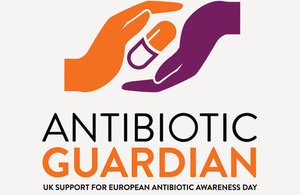Over 11,800 people have pledged to protect antibiotics by becoming Antibiotic Guardians
Thousands sign up to be Antibiotic Guardians – join the campaign today.

Over 8,100 healthcare professionals and 3,600 members of the public have pledged to do their own part to help reduce antibiotic resistance.
The Antibiotic Guardian was launched in September by Public Health England (PHE) as part of activities to support European Antibiotic Awareness Day. The campaign will continue to run throughout the year to encourage more people to make pledges to help save our antibiotics.
Leading the 8,189 healthcare professionals who made a pledge were pharmacy teams with 2,658 people (32%) pledging to be Antibiotic Guardians. These were followed by nurses forming a further 11% (875) and secondary care prescribers with 10% of the total (792).
The most popular pledge chosen by the pharmacy teams was when giving a patient their medicines they would ensure that they would talk to the patient about how to take them and why this is important. Reminding the patient not to share them or re-use them at a later date would also be a key message to discuss with the patient.
Taking antibiotics at regular intervals throughout the day is important as it ensures that the right amount of antibiotic is around the infection all the time. Any reduction in the amount of antibiotic at the site of the infection means that some of the harmful bacteria may not be killed and survive. This is an issue as it may have developed the ability to resist antibiotics which could be a problem if that person develops an infection in the future.
Of the 3,644 members of the public who made a pledge the majority (69%) are adults and 604 (17%) selected the pledges for families. Over half of all adults (57%) and 41% of families pledged to consult their pharmacist when they had illnesses such as coughs, colds and sore throats.
Dr Diane Ashiru-Oredope, Pharmacist Lead and lead for the Antibiotic Guardian campaign at PHE, said:
We launched the Antibiotic Guardian campaign in September and we have been very encouraged by how many people have engaged with it and made a pledge to do their part to help protect antibiotics.
Changing the behaviour of those that prescribe and the expectations of the patients that they will always receive antibiotics is very important. Antibiotics need to be used for the right infection, at the right dose and at the right time. If antibiotics are given to people who do not have a bacterial infection such as the majority of coughs, colds and sore throats they will not help that person get better and will needlessly feed into the cycle of antibiotic resistance potentially rendering them useless within individuals in the future.
Moving forwards we will continue to engage with both prescribers and the public to improve awareness of this issue and to encourage as many people as possible to become Antibiotic Guardians. By Antibiotic Awareness Day 2015, we want to have 100,000 Antibiotic Guardians signed up.
Chief Medical Officer Dame Sally C Davies said:
It is fantastic to see so many people signing up to become an Antibiotic Guardian, and pharmacists are key to the success of this campaign. By raising awareness of this issue and pledging to make a difference, we can start to tackle what is one of the biggest threats to modern medicine. We must act now if antibiotic resistance is to be stopped in its tracks.
Notes to Editors
-
To make a pledge visit the Antibiotic Guardian.
-
Public Health England exists to protect and improve the nation’s health and wellbeing, and reduce health inequalities. It does this through world-class science, knowledge and intelligence, advocacy, partnerships and the delivery of specialist public health services. PHE is an operationally autonomous executive agency of the Department of Health.
www.gov.uk/phe, Twitter: @PHE_uk, Facebook: www.facebook.com/PublicHealthEngland